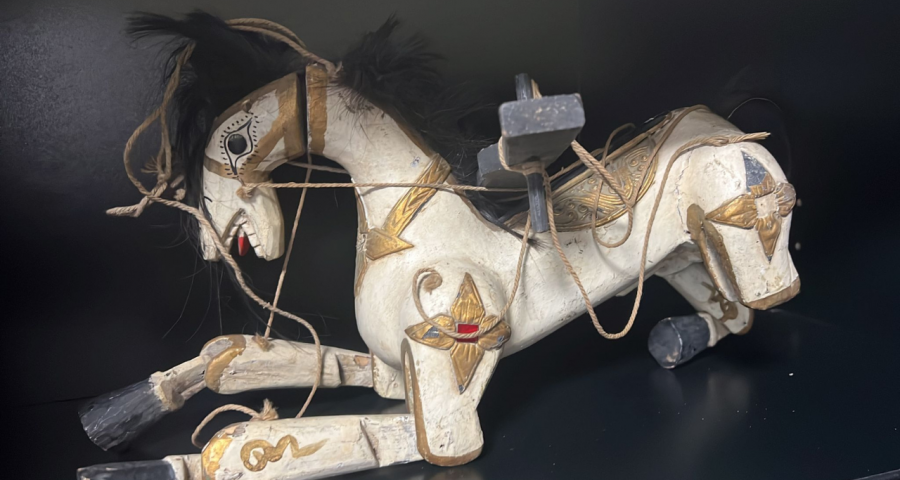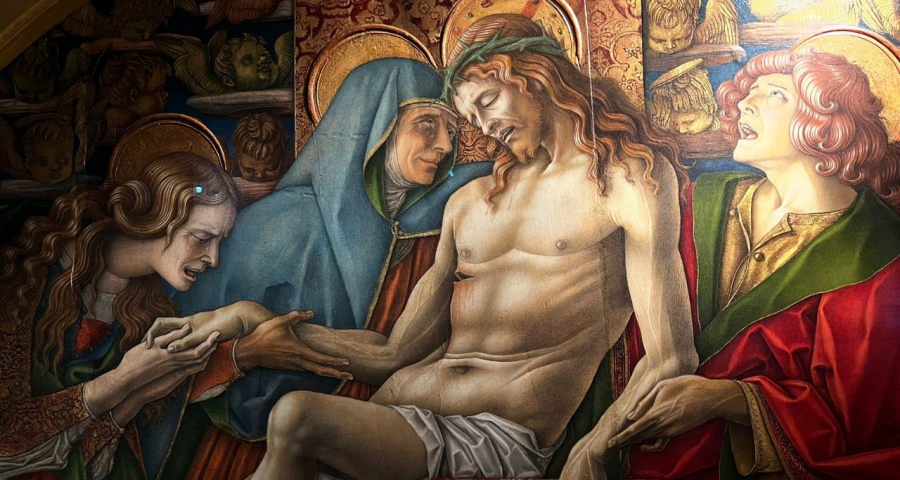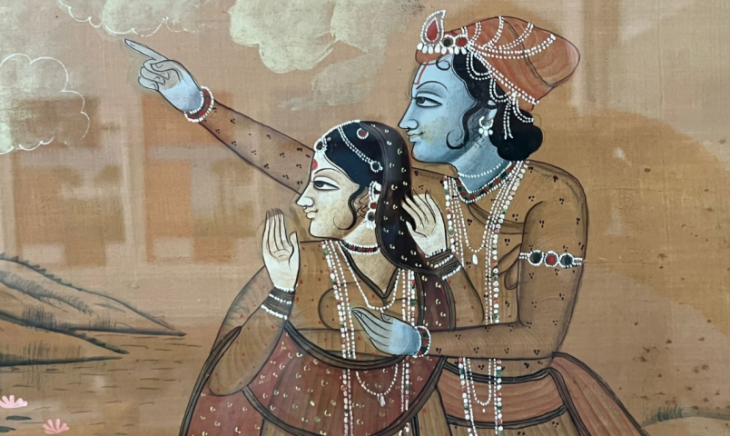The Star of absence/4 - The moment in which Hadassah becomes Esther is about mourning and the beginning of resurrection
By Luigino Bruni
Published in Avvenire 11/12/2022
Against the opinion of all her relatives, Elizabeth is the one who would like to call her son by his father's name, who intervenes by saying: «No! He is to be called John» (Luke 1,60). Calling his son Zacharias would have meant leading him back to an already traced path, that of his father's priestly ministry, preventing him from expressing his own originality
Alberto Mello, The name and the face/Il nome e il volto
The beauty contest to choose the king's new favourite teaches us important things about names and vocations, seen from the different and unique perspective of women.
All true vocations are wonderful. It is the experience of the sublime, when a single moment has infinite value, and is therefore by itself enough to give meaning to an entire existence. Hence, it may be that a person hears the voice only once in his or her life, gone after saying his or her name; but that single encounter is enough to continue the flight to the last nest beyond the last horizon. Sometimes, in a vocation, however, a second call can be experienced. It is the one that arrives in the adult season of life when, one day, we discover the essence of the first call and set off on a new journey, all similar and all different from the first one. A new call from that same good voice, which calls upon us, not to use us or satisfy its own needs - not even God's needs - but only to make us flourish freely. However, the Bible tells us that not all second calls are good, not all of them are words of life. And we see this, because even today there are women and men who are waiting for second calls that are not good. Like that call from someone who once gave us a "gift" that we mistakenly accepted despite knowing that one day he or she would call us back to demand a reciprocity that felt wrong: and every time the phone rings the same fear returns again, killing hope.
« Later when King Xerxes’ fury had subsided, he remembered Vashti» (Esther 2,1). Ahasuerus’s banquet is over; the fumes of alcohol have dissipated together with the king’s wrath unleashed by the great refusal of his wife Vashti. And here are his officials looking for a solution to the marital and political crisis: «“Let a search be made for beautiful young virgins for the king. Let the king appoint commissioners in every province of his realm to bring all these beautiful young women into the harem at the citadel of Susa. Let them be placed under the care of Hegai, the king’s eunuch, who is in charge of the women; and let beauty treatments be given to them. Then let the young woman who pleases the king be queen instead of Vashti.” This advice appealed to the king, and he followed it» (Esther 2,2-4). Thus, the first (and only) beauty contest makes its appearance in the Bible. As in all of these competitions, the main impression is a loss in dignity of the women involved, who, as in the proposal rejected by Queen Vashti, must parade on catwalks prepared by men for the benefit of other men. The Book of Esther continues its story in a climate of female humiliation, in a heavy and vulgar male atmosphere, where women are necessary extras in a show for adult men only.
«Now there was in the citadel of Susa a Jew of the tribe of Benjamin, named Mordecai son of Jair, the son of Shimei, the son of Kish, who had been carried into exile from Jerusalem by Nebuchadnezzar king of Babylon… Mordecai had a cousin named Hadassah, whom he had brought up because she had neither father nor mother. This young woman, who was also known as Esther, had a lovely figure and was beautiful. Mordecai had taken her as his own daughter when her father and mother died» (Esther 2,5-7). Here are at the two main protagonists of the book: Mordecai and Esther, whose Hebrew name was Hadassah, meaning "myrtle", a detail that we only find in the Masoretic (Hebrew) text, not in the Greek one. This name is not ever mentioned in the book again, telling us that the entrance of "Myrtle" in Ahasuerus’s court, to her, meant to renounce her own profound identity. Anyone who knows the Bible knows what a "name" truly means in it – maybe this is why we only find her real name in the Hebrew text. Our name is destiny, our place in the world, a task, an indelible mark of the soul that only God can change in view of an even more beautiful task-place-destiny. In revealing to us the first Jewish name, that of the house and of the mother, that ancient author wanted to tell us something important about the first price that Esther had to pay to enter that mysterious economy of salvation. And in the Bible, the name is chosen by the mother. Starting with Eve (Genesis 4,1), she is the one who possesses the knowledge of the entrails necessary to impress on her child the sign of the meaning of life. God reveals his name to a man, Moses, but the names of men and women are revealed by women, it is their task. Hence, there is something intimate and special that cannot go unnoticed in the fact of a woman giving up her first name Absence in Esther is also the absence of the name.
However, if Esther is also the name of a vocation – and it is – then this game of names also reveals something of the very grammar of vocations. Every new name is a name resurrected on the death of the first house name. You come into the world one day with a name, to a place, to a time. On another different day, in another place, a voice calls us, introducing us to another time, giving us a new name. For some time, sometimes a long time, the two names coexist next to (or within) each other, one calls and the other answers in unison. Nevertheless, there is a decisive moment when we find out that the first name died on the day of the second name, but we had not noticed because a good hand had covered the eyes of our heart. Suddenly, we realize that that first "Myrtle" died to generate "Esther" in the birth of the spirit. The life we could have lived and did not live, the partner we could have had close to us, but do not have, the children we have not brought into the world, suddenly become clear to us. We have done our job, we have followed the voice and we do not want to go back, but on that day, we understand the value and cost of that first name. The different kind of moment in which the butterfly misses the caterpillar, although it would never give up its ephemeral flight. Thus, if the biblical link between women and names is true, then it must be true that when nostalgia for the first name returns in a woman, the experience is stronger, and her death in order to generate a second name hurts more. There may perhaps be something of all of this in this fleeting reference to Esther’s Hebrew name.
Mordecai is also a Babylonian name ("calf of Marduk", a deity), but without any reference to the first Hebrew name, the vocation at stake in this book is that of Esther, not that of her cousin Mordecai. He is from the tribe of Benjamin, a name that says many painful and complicated things in the Bible. It is the tribe of Saul, the first king, cursed and repudiated by God, defeated by David, cursed by Shimei. Benjamin, and then the tribe of Jeremiah, the prophet of exile. In fact, the text tells us that Mordecai (or, more likely, his great-great-grandfather Kish) had been deported to Babylon. Exile is also well present in the Hebrew verbs used to say that the girls were "taken" from their homes and "brought" to the "women's house" of the king, under the custody of the eunuchs (there would also be much to say about these dramatic figures). «When the king’s order and edict had been proclaimed, many young women were brought to the citadel of Susa and put under the care of Hegai. Esther also was taken to the king’s palace and entrusted to Hegai, who had charge of the harem» (Esther 2,8). Exile, once again, female deportation, women being prepared and offered to the king in order to choose his "favourite".
Here is the description of the procedure that would lead to the selection of the new queen: «Before a young woman’s turn came to go in to King Xerxes, she had to complete twelve months of beauty treatments prescribed for the women, six months with oil of myrrh and six with perfumes and cosmetics. And this is how she would go to the king… In the evening she would go there and in the morning return to another part of the harem to the care of Shaashgaz, the king’s eunuch who was in charge of the concubines. She would not return to the king unless he was pleased with her and summoned her by name» (Esther 2,12-14). An atmosphere that closely resembles that of The Arabian Nights and the cruelty of King Shahryar who, betrayed by his wife, consumes a new woman every night and has her killed the following morning. In this bizarre contest, however, the girls are not killed after the test is complete; they are simply kept in the house of the concubines, of which they have become part and can only leave when their beauty has faded, unless they receive a "second summon by name" due to the king's carnal desire. A different form of death.
Before the test, however, the girls had to undergo twelve months (!) of treatments with oils and aromas, in order to be able to present themselves in ideal conditions for that one decisive meeting with the king. Oiled and perfumed, with cosmetics "prescribed for the women", an expression that reveals the incompetence on the part of the author, evidently male and far removed from these female affairs (but commissioned by men).
In conclusion, let us linger a little in the company of those female slaves waiting for a possible and improbable second call from the king, to which they could only answer affirmatively with a "yes". These pages are not the same when read by a woman, whether back in the day or today. Her eyes and her soul see different things. Nevertheless, let us imagine those months, those years spent waiting for a second summon "by name", living while being caught between two fears: that of not being among the "summoned" women, and that of an appointment in the hands of an almighty ruler. Different fears of women, always and only fears. Let me add a footnote: when we use the metaphor of the virgin "brides" of God, perhaps together with the Canticle, in Church, we would do well to keep these pages in the Book of Esther in mind, as well. They suggest the ambivalence of spousal metaphors, even when God is playing the role of the king – unlike women in movies, real women generally do not want to marry kings: sometimes they prefer crucifixes, and crowns of thorns, to diamonds.
A civilization tends to grow in humanity when it manages to increase calls and "summons by name" that are genuinely good, while going to great lengths to reduce bad ones.













